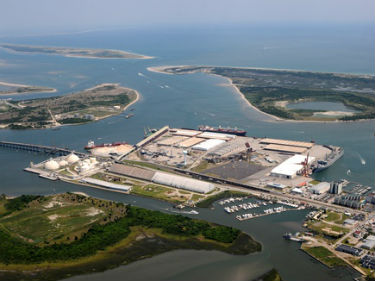MOREHEAD CITY — The N.C. State Ports Authority’s latest plans to bring wood-pellet storage and exporting facilities at the ports here and in Wilmington were made public only after its board approved them, which has once again raised suspicions in Morehead City.
The board agreed during its April 25 meeting to allow negotiations of final contract terms with private companies to bring the facilities to the state-owned ports. There was no public notice that the board was going to discuss the issue.
Supporter Spotlight
 Thomas Bradshaw |
 Danny McComas |
It was a move that smacked in the face of assurances last fall from Thomas Bradshaw, the former Ports executive director, that the authority would maintain transparency and keep the public involved in discussions of the proposed project.
Bradshaw’s comments were meant to calm local residents whose suspicions were raised in 2011 when the Port Authority approved a sulfur smelter at the Morehead port without many local people knowing about it. A broad coalition formed to fight the smelter. The project was eventually canceled, and then-Gov. Beverly Perdue assured local residents that they would be consulted in future projects at the local port. She later signed an executive order that requires the Ports Authority to consider the effects new projects would have on the Carteret County’s tourist-based economy.
The Ports Authority board’s latest decision also further raised concerns from the Southern Environmental Law Center, whose director fired off a strong response questioning the board’s adherence to public records laws.
“There was no advance notice,” said Neal Littman, general manager of the Morehead City Yacht Basin neighboring the Morehead City port. “If it was such a good idea why wasn’t there a brass band trumpeting down the road shouting it’s a good thing for Morehead City?”
Littman was one of the leaders in the fight against the smelter.
Supporter Spotlight
Beaufort Mayor Richard Stanley expressed a similar sentiment.
“It’s been very frustrating to be told ‘we’re going to operate one way’ and they go the exact opposite,” he said. “It’s fairly different from what the former director said was going to happen. It didn’t happen. The state Ports Authority needs to know that they need the full backing of the people down here. We want to help the state Ports Authority to create jobs, but not at a great cost to us.”
The Morehead City town council, on the other hand,passed a resolution last year in support on the pellet plan.
When Bradshaw met with Carteret County and Morehead City elected officials in late October, he said there would be a follow-up public meeting to answer questions from locals about the facilities and the railroad traffic associated with transporting wood pellets to the port. The single rail line into the port passed through the middle of downtown Morehead City.
But Bradshaw abruptly left the authority in January.
Danny McComas, the Ports Authority chairman, said he was not aware Bradshaw agreed to a follow-up public meeting.
“I will look into that,” McComas said. “We’re trying to be as transparent as possible.”
He told the board following the April meeting that he was uncomfortable with its decision giving he and acting Executive Director Jeff Miles authority to negotiate and sign off on a final contract with the companies.
His concerns prompted the board to change its original vote during a May 6 teleconference meeting where members unanimously voted that any contract be reviewed and approved by the board.
 The N.C. State Ports Authority want to begin shipping wood pellets from its port in Morehead City. Photo: N.C. State Ports Authority |
McComas said that the very nature of negotiating contracts means that releasing too much information could jeopardize the projects.
“A lot of these things are being negotiated,” McComas said. “I don’t think there’s a whole lot to talk about at this point. It’s all very fluid. We do not have an agreement. It’s still all up in the air.”
As soon as the board can, it will introduce proposed plans to the public, he said.
The Ports Authority wants to seize an opportunity to ship wood pellets to Europe, where the demand for renewable energy sources is growing as governments pressure utility companies to cut greenhouse gas emissions.
According to general summaries released by the Ports Authority earlier this month, the project in Morehead City will cost upwards of an estimated $15 million and is a scaled-down version of the one initially envisioned at the port.
The facility would be similar to the one proposed for the port in Wilmington, which will include rail and truck unloading stations, two concrete storage domes, each of which will have 37,500 metric tons of capacity and a ship loader/dock conveyor complex. That facility would be used and paid for by Enviva Holdings, a Maryland-based company with plans to build wood-pellet manufacturing plants in North Carolina.
International WoodFuels plans to build a wood-pellet manufacturing plant in Sims to produce 285,000 metric tons a year, all of which will be shipped through Morehead City to a buyer in Europe. The company will be ready to start shipping pellets as early as July 2014.
The projected amount of pellets that will be produced will require an additional 55 to 60 railcars a week to the port.
In 2015, WoodFuels plans to begin operations of a second production plant that is also expected to produce 285,000 metric tons, increasing annual shipments through Morehead City to at least 400,000 metric tons.
This continues to worry residents about increased train traffic through Morehead City, the potential effects of harvesting the pellets from the state’s forests and the size of the storage buildings.
“Wood pellets may be a perfect commodity to handle at the port,” Mike Wagoner, president of the Carteret County Chamber of Commerce, said. “I just think that there are some questions that the community has about the increase in rail traffic and whether there would be any dust associated with the project and how tall the storage facilities are going to be.”
Last fall, the Southern Environmental Law Center, on behalf of the N.C. Coastal Federation, requested all public records pertaining to the projects.
 Enviva stores and ships pellets from its facilities in Chesapeake, Va. Photo: Enviva |
In a May 3 letter sent to the Ports Authority following the board’s April 24 meeting, Director Derb Carter asserts that the board “has restricted public information and acted outside the spirit, if not the letter, of state law requiring open deliberation.”
The Ports Authority sent records from March 2012 through mid-November 2013 to the SELC on April 19.
“We waited six months for records that were five months out of date,” Carter wrote. “This response fell far short of the statute’s requirement that public records be provided to a requestor ‘as promptly as possible.’”
The letter concludes that the Ports Authority is “intentionally trying to avoid public disclosure and input on these proposed projects.”
This is a familiar storyline for Morehead City, Littman said.
“It’s the same thing all over again,” Littman said. “In a Carteret County Chamber of Commerce board meeting recently, they felt like it was a different topic, same modus operandi. We’ll see how this shakes out in the near term. The entire project in our opinion is a little shaky.”
Wagoner said the town remains hopeful that residents will get answers to their questions about the project before it is approved.
“We’re still hopeful that they will follow through on the commitment that was made by the prior executive director to come back and have a part two of that community meeting and tell us about their latest plans and what the latest impact is going to be,” he said. “I think that we’re still optimistic that the Ports Authority will comply with the intent of Governor Beverly Perdue’s executive order that asks them to consider the impact on the tourism and water-based economy.”







